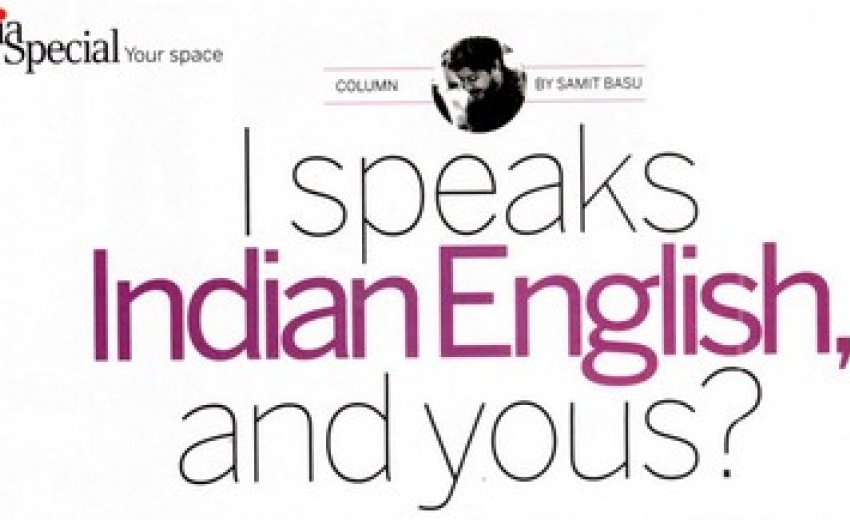Indianisms are a perfectly valid form of English – as are Americanisms – excluded only by rank snobbery. They should form part of our language’s global vocabulary
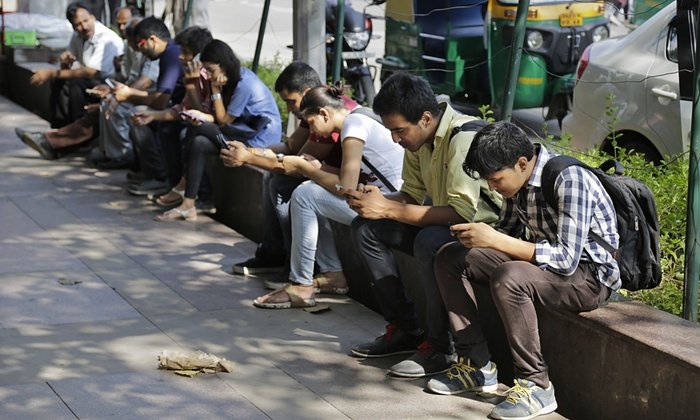 |
| ‘Some Indianisms are too useful, or too colourful and endearing, to be forgotten.’ Photograph: Altaf Qadri/AP |
![]() repone. Don’t all shudder at once. You may think this word sounds wrong, but millions of Indians use it every day. Shorter and handier than using the phrase “Do you want to bring our meeting forward by a day?” In 2010, the word was added to the Oxford English Dictionary, but is still rarely used by those outside south Asia.
repone. Don’t all shudder at once. You may think this word sounds wrong, but millions of Indians use it every day. Shorter and handier than using the phrase “Do you want to bring our meeting forward by a day?” In 2010, the word was added to the Oxford English Dictionary, but is still rarely used by those outside south Asia.
Lately, observers have been arguing that useful Indianisms such as prepone should form part of the global vocabulary of our language. Indian English, they say, is a perfectly valid form of English – as is American or east Asian English – excluded only by rank snobbery.
As an occasional teacher of journalism to college students, I used to despise Indianisms. But I have begun to change my mind, and wondering if I am being too pernickety. Many are so handy that I find myself using them surreptitiously, in speech, if not in formal writing. When expressions like “lol” and “bae” are part of modern lingo, can we sneer at prepone and its ilk? Here’s a list of Indianisms that strike me as too useful, or too colourful and endearing, to be forgotten.
Do the needful
The granddaddy of all Indianisms, a clunky phrase mostly used only by bureaucrats and people forced to plead with the bureaucracy. And yet so apt when you don’t want to type out, “Please send me the five forms I need to file my taxes” or “Please fix the road in front of my house that I have written three letters about already”. “Do the needful” covers a multitude of requirements, and avoids repetition. Should it be revived, old fashioned though it is?
Veg and non-veg
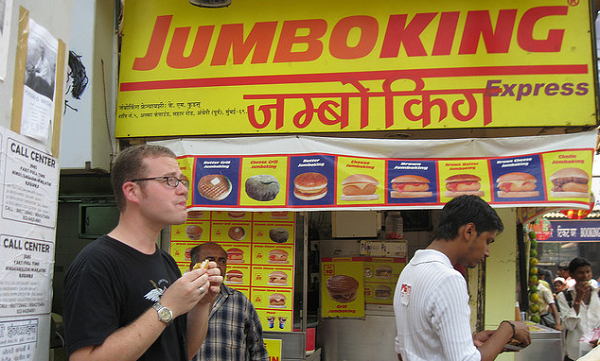 |
| ‘Veg is veg.’ The vegetarian Jumbo King food outlet in Mumbai. |
In a country where so many of us are strict vegetarians, it’s crucial to class the populace by diet. Indians use a simple, universally understood shorthand in speech, menus and matrimonial columns: vegetarian or non-vegetarian? Just saying “I am veg”, will ensure that only vegetables, not even eggs or fish, will cross your path. No need for dancing around elaborate lacto-ovo-pescatarian definitions. No need to drive people insane by saying, “Ooh, I am a vegetarian, but partial to fish”. Veg is veg.
Auntie/uncle
In India, this term is also used for non-relations: older people we are on friendly terms with, such as the parents of our friends or elderly neighbours. Many of us find it less cold and more endearing than Mrs X or Mr Y. It’s also a useful indicator of age. If the neighbourhood kids are calling you “uncle”, it’s time to reconsider that hipster man bun.
Rowdy sheeter
A term regularly used by smaller Indian papers to refer to someone who has a long and storied criminal record. So much more expressive than “dangerous criminal”, so much more colourful than “thug” or “goon”. Rowdy sheeter made it into the Cambridge English Dictionary, but is it time it made it further?
Timepass
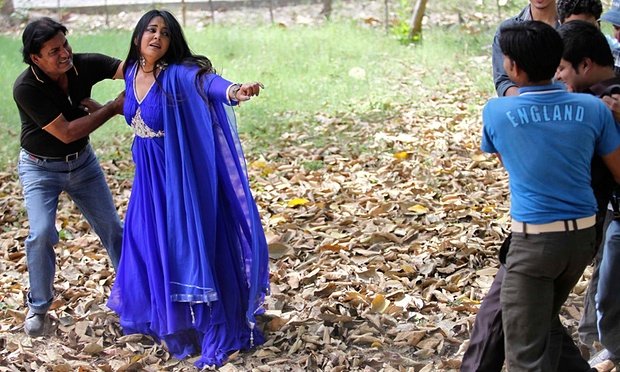 |
| ‘Especially useful for Bollywood movies and reality television.’ Actress Nainaa Jolly filming a low-budget Hindi movie in Meerut, Uttar Pradesh. Photograph: Reuters |
An expression used for anything that is frivolous, vaguely silly, killing time, and a guilty pleasure. Especially useful for Bollywood movies and reality television. “How was the latest episode of I’m a Celebrity … Get Me Out of Here? Oh, you know, timepass.”
Fortnightly
Britain and India still have a few things in common. Among them is the use of fortnight as a measure of time, something that completely baffles our American cousins. I think it deserves to be used widely. Much better than saying take this pill every two weeks. Or come back to me in 14 days.
Mugging
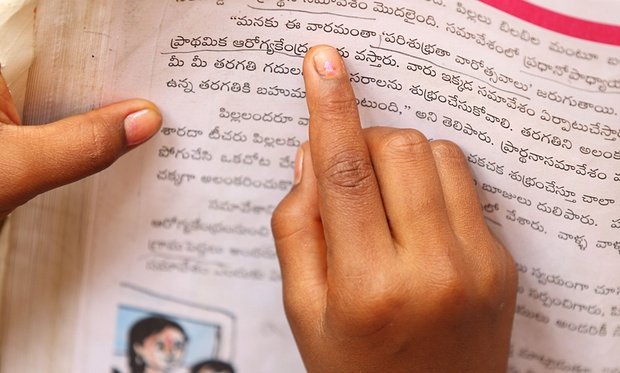 |
| ‘No other word would fit the intense ritual of committing to memory that is a part of the Indian education system.’ A schoolgirl reading in Telugu, Andhra Pradesh, south India. Photograph: Alamy |
Used in India to mean memorising and rote learning, not to take away someone’s money by threatening violence. Really, no other word would fit the intense ritual of committing to memory that is a part of the Indian education system. Cramming would be a weak substitute. The constant swaying back and forth that accompanies the recitation of times or periodic tables can only be mugging.
Kindly adjust
 |
| ‘It hides a wealth of meaning in a crowded country with fraying tempers where we are all constantly stepping on one another’s feet.’ Passengers at the railway station in Ahmadabad, Gujarat. Photograph: Ajit Solanki/AP |
This is the Indian version of “Sorry, please excuse the inconvenience I am causing you, but I can’t do anything much about it right now”. It’s what Indians say when forced to share an already too small train compartment, or when packed into a tiny elevator. It hides a wealth of meaning in a crowded country with fraying tempers where we are all constantly stepping on one another’s feet. Imagine how it would defuse tempers on the tube when your backpack is sticking in someone’s face.
Rest is fine
Indian shorthand for “I don’t have time to go into everything that I have been doing, but worry not because we are all just fine and dandy”. Just right for your Xmas round-robin when you don’t feel like going into the details of how little Johnny got expelled from school for setting fire to the toilets. Instead, just begin with “Season’s greetings”, mention how you ran the marathon and started a juice cleanse, then end with “Rest is fine”.
What’s your good name
I used to hate this phrase. A literal translation of a Hindi phrase, I thought of this as stuffy and pompous. But lately, as I get older and my memory fails, I have been finding this very useful, as a gentler, kinder, less abrupt version of “I have forgotten your name even though I’ve met you at least half a dozen times”. Especially useful in family events when an unknown person beams at you while you are trying to place them. I simply say, “Your good name, please”, and it smooths over the awkward moment.
